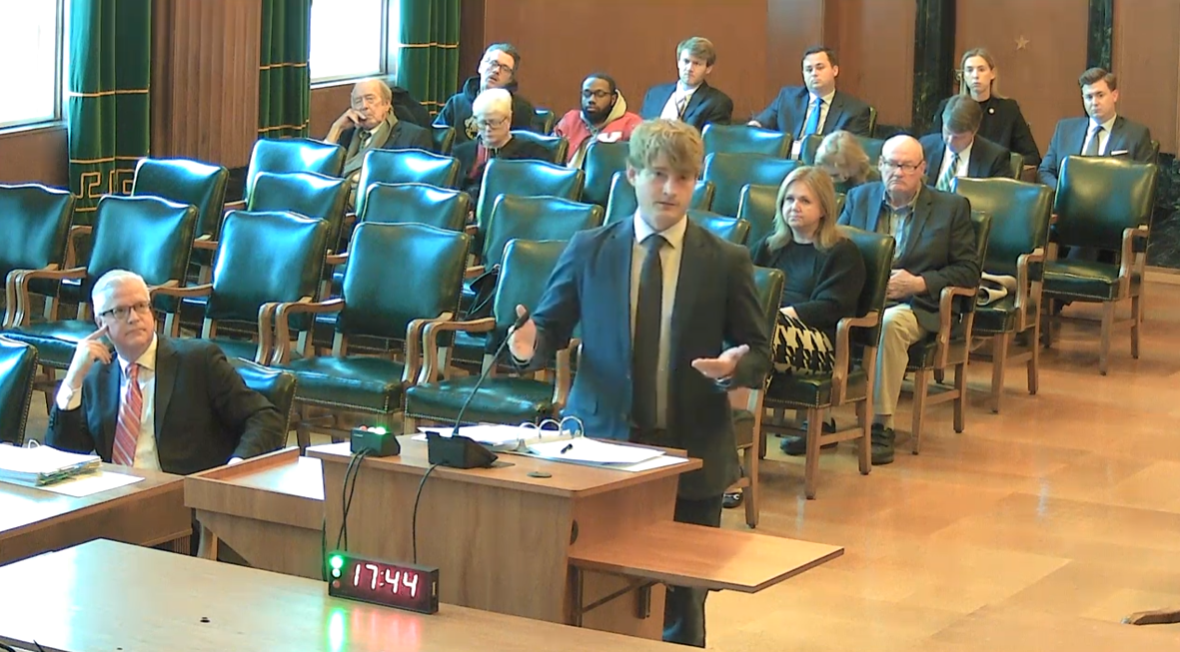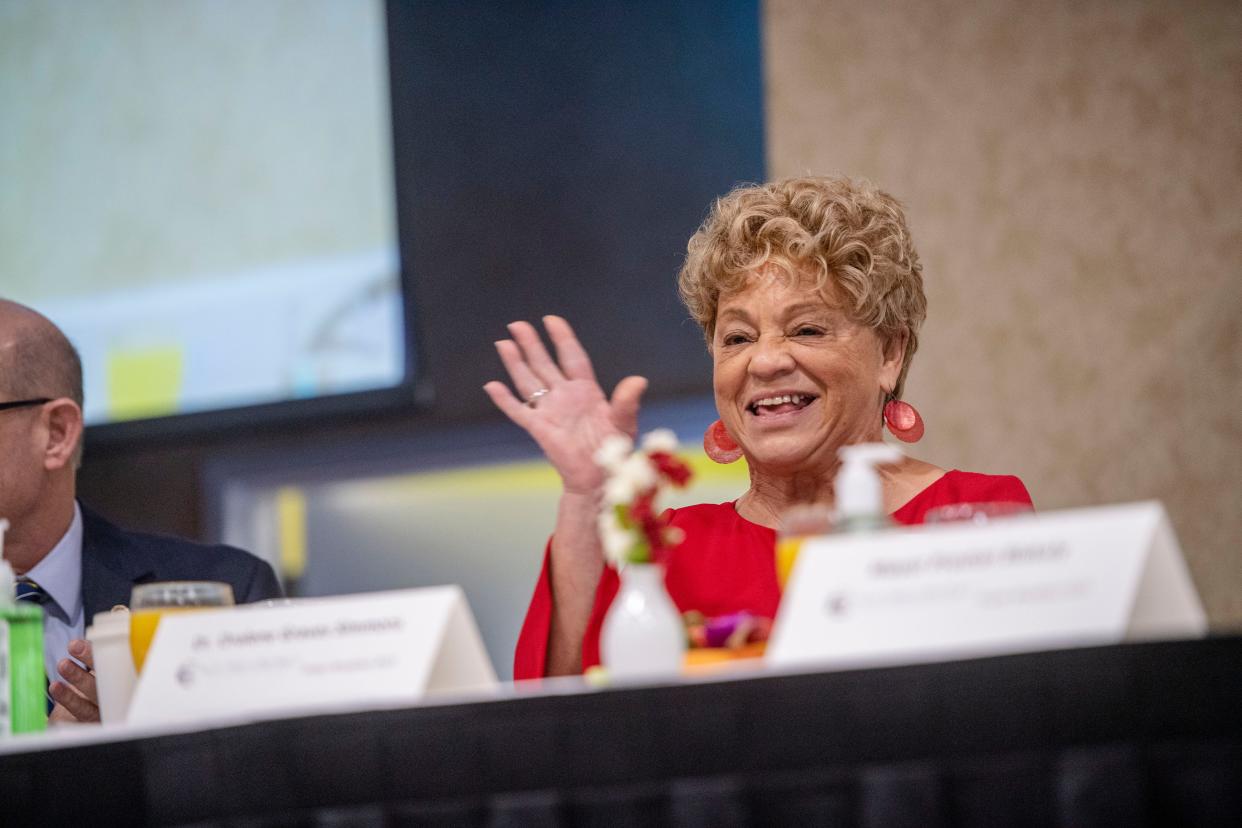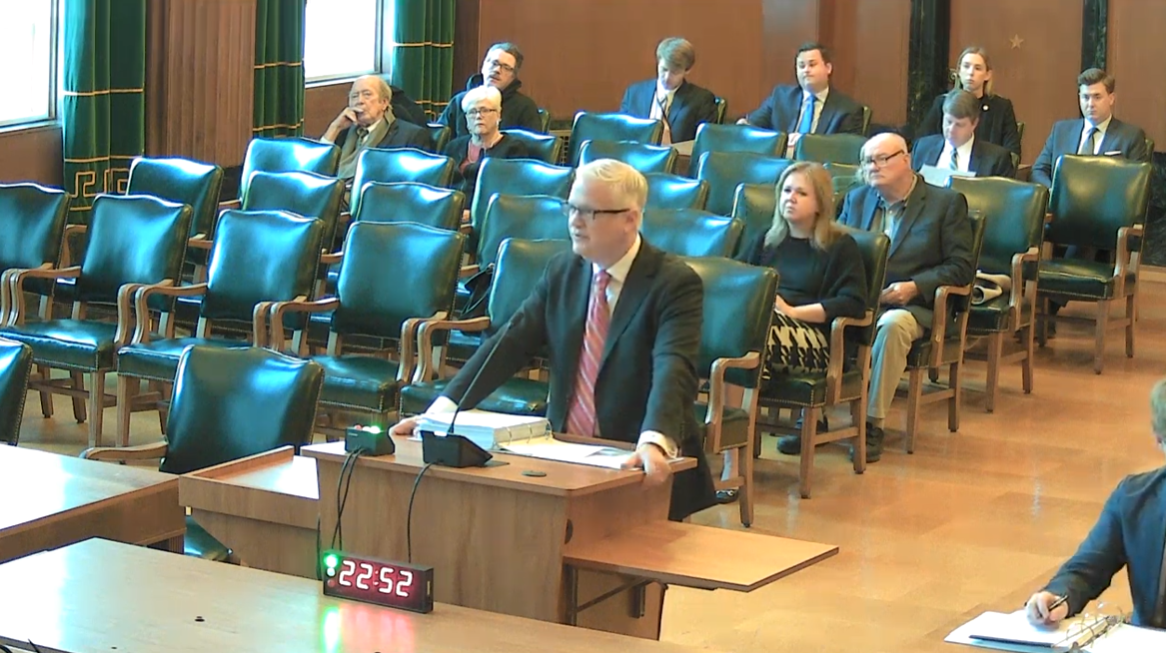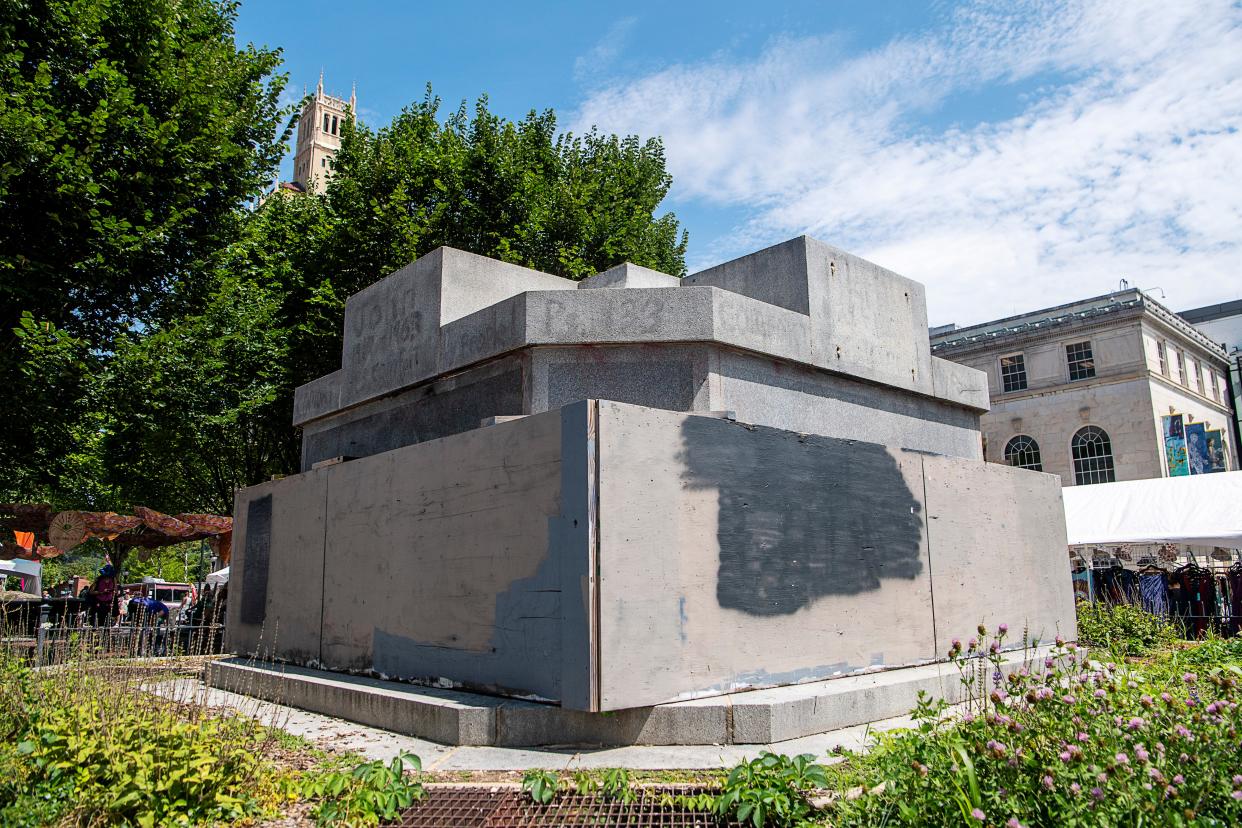NC Supreme Court hears case of Vance Monument, which honors Confederate-era governor

The state's highest court heard oral arguments Nov. 1 in the "historic" case challenging the removal of a downtown Asheville monument honoring a Confederate-era governor. A final opinion from the court could take weeks or months to be issued.
In downtown Raleigh's Justice Building, the seven justices heard 30 minutes of argument each from Edward Phillips, lawyer for the Society for the Historical Preservation of the 26th North Carolina Troops ― the group that brought the challenge against the city ― and Asheville Senior Assistant City Attorney Eric Edgerton.
Issues of standing, a much-debated 2015 donation agreement and a similar monument removal case decided by the Supreme Court late last year, were central to the hearing.
The lawsuit surrounds the 75-foot-tall granite Vance Monument, which stood in Pack Square Plaza since 1898, all but its base taken down as of June 2021 after Asheville City Council voted 6-1 to remove it in March of that year.
The Society for the Historical Preservation of the 26th North Carolina Troops, called a "Confederacy special interest group" by some, is seeking to stop the removal and potentially reconstruct Vance Monument. The society filed the initial lawsuit against the city of Asheville in March 2021. After judgments from two lower courts, both ruling in favor of the city, the N.C. Supreme Court agreed in December to review the case.
The monument honors Zebulon Vance, a "former slave holder, Confederate colonel and white supremacist," according to remarks made by Jake Sussman, chief counsel with the Justice System Reform project at the Southern Coalition for Social Justice.
"Community members in support of the monument's removal are here to speak about this historic moment," he said, introducing a Nov. 1 press briefing following the hearing.
Among the speakers was Oralene Simmons, former co-chair of the Vance Monument taskforce, which voted 11-1 to recommend removal of Vance Monument in November 2020.

An Asheville native, Simmons said she is the great-great granddaughter of Joe Anderson, who was enslaved during Vance's tenure as governor. She called the monument a "symbol of power," built in front of the courthouse, where only years earlier enslaved people had been sold on the steps.
“This monument no longer has a place in our mountain town," Simmons said. "We have moved on to the future, which is a place that will bring people together rather than set them apart. If this monument is left in its original form rather than completely removed, it will continue to serve as a symbol of white supremacy to those most affected by its presence.”
More: NC Supreme Court will take up lawsuit over removal of downtown Asheville's Vance Monument
What did the attorneys argue?
During the hearing, Phillips, on behalf of the Society, said the case was about "three distinct and interrelated issues," the first being the state's Monument Protection Act, and the others being the issue of the plaintiff's standing, which the city argued they lack, an argument backed by the opinion from the appellate court in 2022.
As it was in his initial filings, a key facet of Phillips' argument was the $138,447 raised by the plaintiff for the restoration of the monument in 2015, and the "contract" or donation agreement between the city and Historical Preservation group.
“No entity or individuals undertake an extensive restoration of an almost 117-year-old monument with the belief that such restoration is not meant to preserve the restored monument well into the future,” Phillips said during the Nov. 1 hearing.
Several justices lobbed questions about the contract claim, including Associate Justice Anita Earls, who asked, after restoration, what further obligations the donation agreement incurred from the city.
“If the city of Asheville understood itself to be obligated to maintain this monument for a specific amount of time, wouldn’t the agreement need to say that?" Earls asked.
"I wouldn't think so," Phillips said. "The whole effort of restoration is not to say, ‘oh, we’ll just repair things and call it a day.' ... Restoration, by definition, is something that is done to preserve and conserve an object going into the future."

What about the Winston-Salem monument case?
When Edgerton took to the podium, he argued on Asheville's behalf that not only was the breach of contract claim off the table, but that the plaintiff does not have standing to bring the case before the court, one of the questions at the center of the suit.
But there is another "overarching question" that must be considered, Edgerton argued: "Will you take the plaintiff appellant at its word?”
This is relevant, he said, because in submissions to the trial, appellate and supreme courts, Phillips' filings have said Asheville's Vance Monument case is "virtually identical" or "identical" to legal issues present in the Winston-Salem monument case, in which the court ultimately ruled in favor of the city.
The case dealt with a longstanding dispute over the 2019 decision by Winston-Salem officials to remove a more than century-old Confederate statute near the old Forsyth County courthouse.
A decision came in the Winston-Salem case the same day the Supreme Court took up the issue of the Vance Monument.
According to reporting from the Associated Press, the Supreme Court ruled that the local chapter of United Daughters of the Confederacy lacked standing to challenge the Winston-Salem's removal of a Confederate monument on private property, but can refile a future lawsuit making similar arguments.
"It's only now, with the benefit of this court's decision in (United Daughters of the Confederacy v. the city of Winston-Salem) in hand that they seek to reverse course completely," Edgerton said.

In his rebuttal, Phillips said he's not asking the court to overturn the decision in the UDC case, but is "asking you to look at the facts of this case differently, because they were different facts ... With this case there is a contract, which I believe gives us standing and I believe, also, gives us the ability, at least for my client, to challenge the action of the city."
Since that case was decided, the partisan makeup of the Supreme Court has flipped. Trey Allen and Richard Dietz, both Republicans, beat out their Democratic opponents in November 2022. Republicans now hold a 5-2 majority on the panel, the first time since 2016.
More: Redistricting rundown: How new maps and gerrymandering will affect Asheville, Buncombe
What's next?
City Attorney Brad Branham said Oct. 27 that the court generally takes "several weeks or even months to issue an opinion after the hearing are complete."
"There is no set schedule for these decisions to come down," he said. "So we simply have to wait."
At the press briefing, Asheville Mayor Esther Manheimer called the removal of the monument a "necessary step for our community," one that will take Buncombe County and Asheville further along the path to a "more inclusive and equitable community."
More: Asheville's South Slope plan delayed 'indefinitely' while city seeks Southside input
More: $4.3M grant awarded for conservation of 343 acres on Deaverview Mountain; What's next?
Sarah Honosky is the city government reporter for the Asheville Citizen Times, part of the USA TODAY Network. News Tips? Email shonosky@citizentimes.com or message on Twitter at @slhonosky. Please support local, daily journalism with a subscription to the Citizen Times.
This article originally appeared on Asheville Citizen Times: NC Supreme Court hears Asheville's confederate monument case
